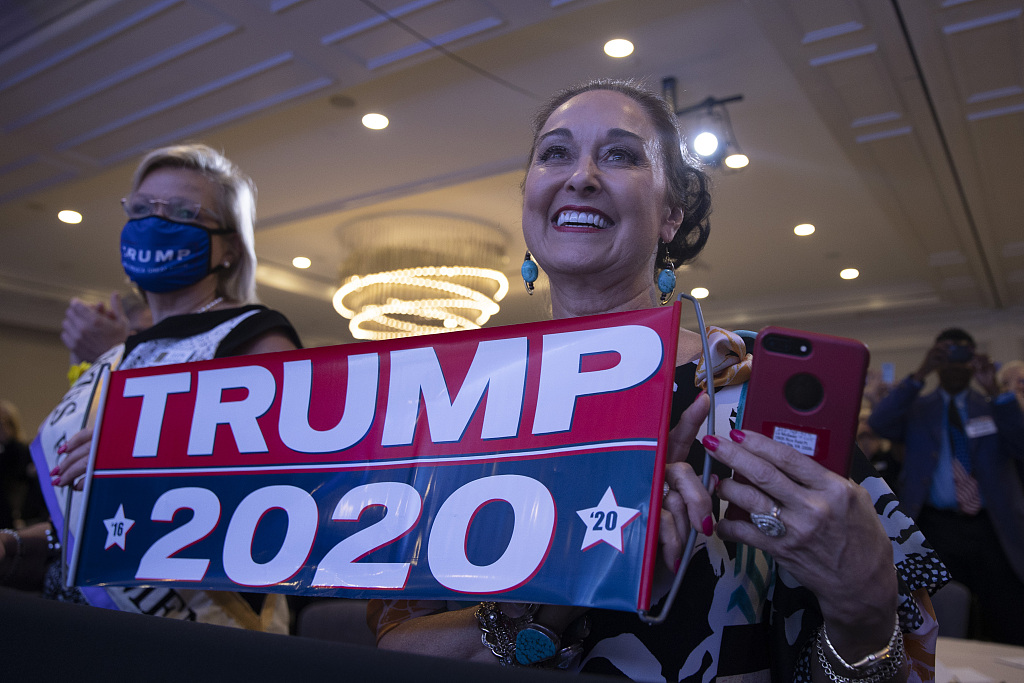
U.S. President Donald Trump delivers remarks in Old Forge, Pennsylvania, U.S., August 20, 2020. /VCG
U.S. President Donald Trump delivers remarks in Old Forge, Pennsylvania, U.S., August 20, 2020. /VCG
Editor's note: Josef Gregory Mahoney is a professor of politics at East China Normal University and executive director of the International Center for Advanced Political Studies. He frequently consults with policymakers in both Washington and Beijing, and is a regular contributor to South China Morning Post and Beijing Review, among others. The article reflects the author's opinions, and not necessarily the views of CGTN.
While many increasingly view Donald Trump as a likely one-termer, and while some evidence indicates the race for the presidency is favoring Joe Biden, here are six reasons why you shouldn't bet against Trump.
Trump's base is an actual base
While there appears to have been some growing dissatisfaction if not erosion in Trump's base, by several accounts it has only fallen from 46 percent to 42 percent. However, while a growing number of his supporters indicate they are unhappy with his performance, there are no indications that this will translate into votes for Biden.
As is tradition, many have watched to see if Biden would enjoy a post-convention "bounce." While his national favorability ratings have improved from 40 to 45 percent after what many assessed as a good performance during his speech accepting the nomination, there has not been any indication yet that this improvement has changed how people will vote.
The bottom-line: Trump's base is actually a base, the margins are small, especially in key states, and nationally about the same number of people have favorable views of each candidate.
This election is more about identity, less about performance
In the past, it was typical for candidates to ask voters if they are better off today than four years ago. Clearly, for tens of millions of people, including millions of Trump supporters, the answer is a resounding "no." So why do some still stick with Trump?
There are lots of reasons why but it comes down to the fact that this race is about identity. It's about how a voter identifies in a longstanding and deepening culture war in a profoundly polarized society. And it's about the media that reinforce the narratives associated with their consumers' identities, in short, telling/selling them what they want to hear, and very little to do with critical assessments aiming for objectivity.
The bottom-line: Many voters support their candidate pathologically, and resort to a non-fact based assessment, a type of post-truth metaphysics where one of the candidates is regarded as evil or the lesser-evil. Consequently, Trump has not had to pay substantially for poor governance, even among many who have been hard hit by the same.

Trump's supporters at the 2020 Council for National Policy Meeting, Arlington, Virginia, U.S., August 21, 2020. /VCG
Trump's supporters at the 2020 Council for National Policy Meeting, Arlington, Virginia, U.S., August 21, 2020. /VCG
Trump is held to lower standards
Nevertheless, it must also be acknowledged that Trump's supporters hold him to a lower standard. Many of his most ardent supporters accept his philandering and troubling morals in his personal life, and even go along with some of his public policies they find unsavory, for the simple reason that some are single-issue or bundle-issue voters, e.g., anti-gun control, anti-abortion, pro-police, anti-tax, pro-financial deregulation, anti-immigrant, anti-China, and so on. Because Trump takes unequivocal stands on their pet issues, he gets their forgiving support.
It doesn't seem to matter that his handling of the pandemic has been a national travesty, or that his other policies have failed or favored the rich, or that he was duly impeached, or that several of his close associates have been convicted of serious crimes. It doesn't matter that he says racially insensitive things, that he provokes continued unrest with protesters in major cities, or that he's tacitly admitted to paying for sex with porn stars and violating election laws by failing to report pay-offs to hide it.
In fact, some of his supporters relish these imperfections as evidence that Trump is not really a politician, and consequently even appear to view them as positive characteristics.
Conversely, Biden's supporters judge carefully every word he says. As insensitive as Trump and his supporters can be, Biden's are the opposite. If Biden makes a small gaffe with how he characterizes Latinx or African Americans, he's quickly criticized in his own camp and issues apologies.
The bottom-line: Among his supporters, Trump can hardly say or do anything wrong, while among Democrats, Biden can hardly say or do anything right.
The electoral college favors Republicans
While the popular vote plays an important role in the election, the winner is actually determined by the Electoral College. Many academic studies have indicated Electoral College has been structurally configured to "massively" favor Republicans, and as the last election demonstrated, Trump won the presidency despite receiving 3 million fewer votes than Hillary Clinton. In the age of polarization, this advantage cannot be underestimated.
The bottom-line: Studies indicate that certain so-called swing states that typically favor Republicans are disproportionately represented in the Electoral College. In other words, one can lose some states by the narrowest of margins while winning others massively, and still lose the election.
Trump is spending more
To date, Biden has raised a reported 699 million U.S. dollars to Trump's 1.21 billion U.S. dollars, and Trump has vastly outspent Biden accordingly, with receipts already exceeding a billion.
The bottom-line: While Trump's fundraising and expenditures started much earlier than Biden's, and while Biden had to fight for the nomination, election-day victories often closely correlate with amounts raised and spent. And at this point, Trump is still far ahead.
Trump is the incumbent
In the past, being an incumbent could hurt a candidate if times were tough during re-election. This explains in part why Jimmy Carter and George H.W. Bush were one-termers. But over time, the further the U.S. has gotten from Watergate, the weaker the legislative branch has become relative to the executive, and especially the more powers the president acquired after 9/11 and the Global Financial Crisis in 2008 — the more power a president has to do things that support re-election.
By some accounts leaders do this in underhanded ways, as alleged in Trump's impeachment through using American money and foreign policy to compel foreign countries to undermine political opponents. More recently are the powerful allegations that Trump has deliberately wrecked the U.S. postal system and discredited mail-in voting to decrease Democratic chances.
U.S. presidents famously occupy a "bully pulpit" and they can make news and insert themselves in the news cycle almost at will. And above all, given extraordinary powers over military affairs and foreign policy — what is sometimes described critically as America's "imperial presidency" — an incumbent can act in powerful ways on the world stage in ways that burnish his image at home.
The bottom-line: While Trump's performance at home and abroad is a mixed record at best and a terrible one in the eyes of many, he holds the reins of tremendous, influential power and Biden does not.
(If you want to contribute and have specific expertise, please contact us at opinions@cgtn.com.)